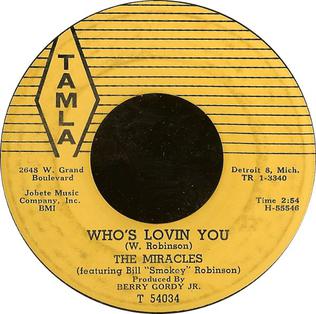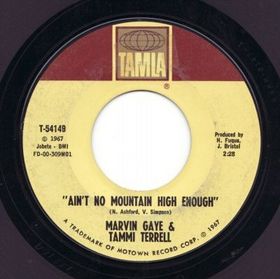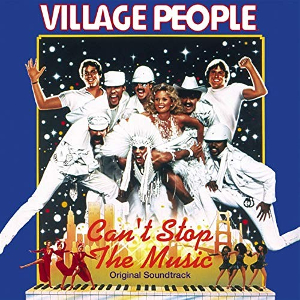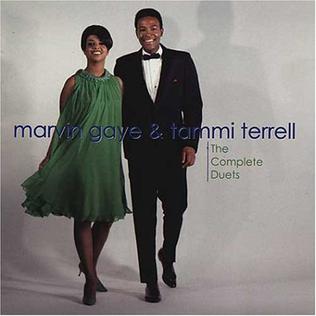Motown is an American record label owned by the Universal Music Group. Founded by Berry Gordy Jr. as Tamla Records on January 12, 1959, it was incorporated as Motown Record Corporation on April 14, 1960. Its name, a portmanteau of motor and town, has become a nickname for Detroit, where the label was originally headquartered.

Easy is an album recorded by Marvin Gaye and Tammi Terrell, and released by Motown Records on September 16, 1969 under the Tamla Records label. One song on the album, "Good Lovin' Ain't Easy To Come By", was a hit single and remains popular to this day.

Thomasina Winifred Montgomery, professionally known as Tammi Terrell, was an American singer-songwriter, widely known as a star singer for Motown Records during the 1960s, notably for a series of duets with singer Marvin Gaye.

Ashford & Simpson were an American husband-and-wife songwriting, production and recording duo composed of Nickolas Ashford and Valerie Simpson.

"Who's Lovin' You" is a Motown soul song, written in 1960 by William "Smokey" Robinson. The song has been recorded by many different artists including The Miracles, who recorded the 1960 original version, The Temptations, The Supremes, Terence Trent D'arby, Brenda and The Tabulations, John Farnham, Human Nature, En Vogue, Michael Bublé and Giorgia Todrani and Jessica Mauboy. The most famous version is attributed to The Jackson 5. Shaheen Jafargholi, then twelve years old, performed the song at Michael Jackson's public memorial service in July 2009.

"Ain't No Mountain High Enough" is a song written by Nickolas Ashford & Valerie Simpson in 1966 for the Tamla label, a division of Motown. The composition was first successful as a 1967 hit single recorded by Marvin Gaye and Tammi Terrell, and became a hit again in 1970 when recorded by former Supremes frontwoman Diana Ross. The song became Ross's first solo number-one hit on the Billboard Hot 100 chart and was nominated for the Grammy Award for Best Female Pop Vocal Performance.

You're All I Need is the second studio album by soul musicians Marvin Gaye and Tammi Terrell, released in August 1968 on Motown-subsidiary label Tamla Records. Highlighted by three hit singles written by Nickolas Ashford and Valerie Simpson, You're All I Need was recorded throughout 1966 and 1967 and features two Top 10 Billboard Hot 100 hits, "Ain't Nothing Like the Real Thing" and "You're All I Need to Get By". It peaked at #60 on the U.S. Billboard 200 Album Chart. You're All I Need was the two singers' final collaboration effort, as Terrell would become ill following recording, before succumbing to a brain tumor in 1970.

Rudolph "Rudy" Bernard Isley was an American singer-songwriter and Christian minister and one of the founding members of The Isley Brothers.

Can't Stop the Music is a 1980 American musical comedy film directed by Nancy Walker in her only directed featured film. Written by Allan Carr and Bronté Woodard, the film is a pseudo-biography of the 1970s disco group the Village People loosely based on the actual story of how the group formed. The film also stars Valerie Perrine, Caitlyn Jenner in her film debut, Steve Guttenberg, Paul Sand, Tammy Grimes, June Havoc, Barbara Rush, Altovise Davis, Marilyn Sokol and The Ritchie Family in their only film.

Victor Edward Willis is an American singer, songwriter and a founding member of the disco group Village People. He performed as their lead singer and was co-songwriter for all of their most successful singles. In the group, he performed costumed as a policeman or a naval officer.

Diana & Marvin is a duets album by American soul musicians Diana Ross and Marvin Gaye, released October 26, 1973 on Motown. Recording sessions for the album took place between 1971 and 1973 at Motown Recording Studios in Hollywood, California. Gaye and Ross were widely recognized at the time as two of the top pop music performers.

"Heat Wave" is a 1963 song written by the Holland–Dozier–Holland songwriting team. It was first made popular by the Motown vocal group Martha and the Vandellas, who issued it as a single on July 10, 1963, on the Motown subsidiary Gordy label. The single reached number one on the Billboard Hot R&B chart—where it stayed for four weeks—and peaking at number 4 on the Billboard Hot 100.
Ray Chew is an American musician who plays keyboards and is a contemporary and orchestral arranger. He has been the music director of ABC's Dancing with the Stars since 2014.

Can't Stop the Music is the sixth studio album and first soundtrack by American disco group Village People, for their film Can't Stop the Music, released in 1980. Though the film was a commercial failure, the album was more well received, reaching number nine on the UK Albums Chart, number 47 on the Billboard 200 in the United States, and number one in Australia. The album was reissued on CD in 1999.

"Can't Stop the Music" is a song recorded by American disco group the Village People. As the group's first release after the exit of original lead singer Victor Willis, with lead vocals sung by replacement cop Ray Simpson, the song was the first Village People single since their commercial breakthrough to not chart inside the US top 40, though it fared much better in Europe, South Africa, and Oceania. It is the title track from the soundtrack album of their feature film, Can't Stop the Music, which failed to attract a major audience, except in Australia.

The Complete Duets is a two-disc compilation album of duet recordings by Motown Records artists Marvin Gaye and Tammi Terrell, recorded between 1965 and 1969. The set compiles all of the tracks from the duo's three albums - United,You're All I Need and Easy - as well as several of Tammi Terrell's solo recordings and other previously unissued material.

Forever Diana: Musical Memoirs is a four-CD box set of recordings by American singer Diana Ross released on October 5, 1993 by Motown Records.

The Four Tops are an American vocal group formed in Detroit, Michigan in 1953 as the Four Aims. They were one of the most commercially successful American pop music groups of the 1960s and helped propel Motown Records to international fame. The group's repertoire has incorporated elements of soul, R&B, disco, adult contemporary, doo-wop, jazz, and show tunes. Lead singer Levi Stubbs, along with backing vocalists Abdul "Duke" Fakir, Renaldo "Obie" Benson and Lawrence Payton remained together in the group for over four decades, performing until 1997 without a change in personnel. Along with fellow Motown groups the Miracles, the Marvelettes, Martha and the Vandellas, the Temptations, and the Supremes, the Four Tops helped to establish the "Motown sound"; pop-friendly soul and R&B with a clean, polished production quality. They were notable for having Stubbs, a baritone, as their lead singer, whereas most other male and mixed vocal groups of the time were fronted by tenors.

Village People is an American disco group known for its on-stage costumes and suggestive lyrics in their music. The group was originally formed by French producers Jacques Morali and Henri Belolo and lead singer Victor Willis following the release of the debut album Village People, which targeted disco's large gay audience. The group's name refers to Manhattan's Greenwich Village, with its reputation as a gayborhood. The characters were a symbolic group of American masculinity and macho gay-fantasy personas. As of January 2020, Willis is the only original member of the group.
Paul Riser is an American trombonist and Motown musical arranger who was responsible for co-writing and arranging dozens of top ten hit records. His legacy as one of the "Funk Brothers" is similar to that of most of the other "Brothers", as his career has been overlooked and overshadowed by the stars of Motown that became household names. Some of the Funk Brothers he worked with include: Earl Van Dyke, Johnny Griffith, Robert White, Eddie Willis, Joe Messina, Dennis Coffey, Wah Wah Watson, James Jamerson, Bob Babbitt, Eddie Watkins, Richard "Pistol" Allen, Uriel Jones, Andrew Smith, Jack Ashford, Valerie Simpson, Eddie "Bongo" Brown, Benny Benjamin, Cornelius Grant, Joe Hunter, Richard "Popcorn" Wylie, Marcus Belgrave, Teddy Buckner and Stevie Wonder.
















